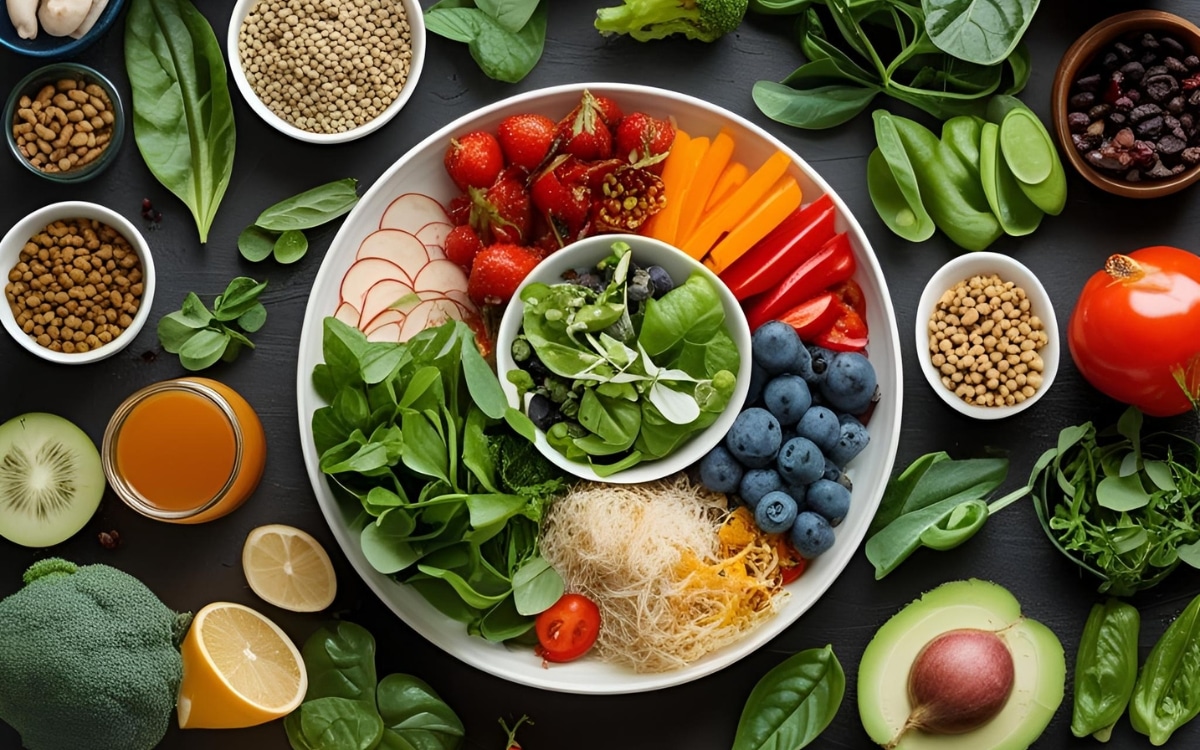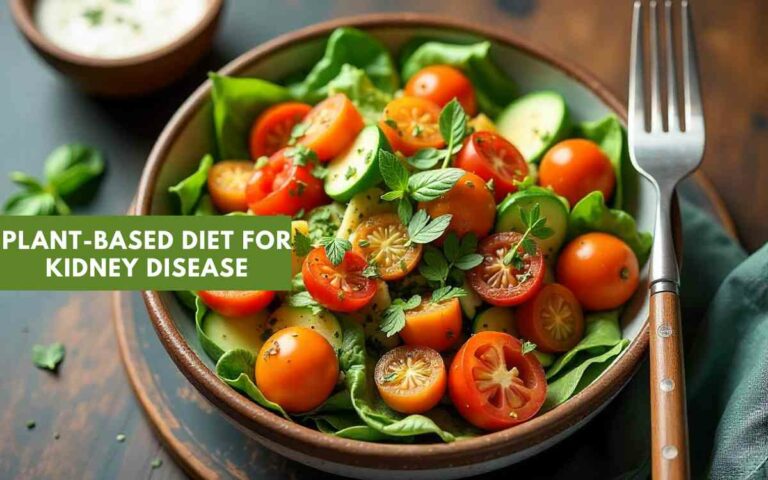The Science Behind Plant-Based Diet for Anxiety
Anxiety affects millions worldwide. Many seek natural remedies for relief.
A plant-based diet might be one solution. This diet is gaining attention for its potential to ease anxiety.
Rich in fruits, vegetables, nuts, and grains, it offers many nutrients. These foods may play a role in calming the mind. Research suggests that certain plant compounds can impact brain health.
These compounds include antioxidants, vitamins, and minerals. They help reduce inflammation and support brain function.
A plant-based diet encourages a balanced intake of these nutrients. This balance can influence mood and stress levels.
As more people explore holistic health, understanding the link between diet and mental well-being is crucial.
Discover how plant foods might help you manage anxiety better. The science offers insights that could change how we view food and mental health.
Key Takeaways:
Expert Guidance:

Plant-based Diet Basics
Discover how a plant-based diet can help reduce anxiety. Scientific studies suggest that fruits, vegetables, and whole grains might lower anxiety levels.
Nutrients like magnesium and omega-3 fatty acids, found in plants, contribute to brain health and emotional balance.
Switching to a plant-based diet can feel like a big change, but understanding the basics can make it easier.
At its core, a plant-based diet focuses on foods that come from plants, including fruits, vegetables, nuts, seeds, oils, whole grains, legumes, and beans.
This doesn’t mean you must cut out all animal products unless you choose to. You can adjust it to fit your lifestyle and needs. Thinking of taking the plunge? Let’s break it down step by step.
Key Components
A plant-based diet is all about diversity. It encourages you to fill your plate with a wide range of plant foods.
This variety ensures you get different nutrients. You might have a vibrant salad with leafy greens, colorful veggies, and a sprinkle of seeds one day.
The next day, it could be a hearty lentil soup with whole grain bread. Whole grains like brown rice, quinoa, and oats are staples. They’re filling and provide energy.
Legumes, such as beans and lentils, are great for protein. Don’t forget nuts and seeds; they offer healthy fats and a satisfying crunch.
Nutritional Benefits
One of the biggest perks of a plant-based diet is its richness in nutrients. These foods are packed with vitamins, minerals, and antioxidants.
Eating more plants can boost your mood and help manage anxiety. Consider the magnesium in leafy greens; it’s known to support brain health.
Omega-3 fatty acids found in walnuts and flaxseeds can improve your mood. Fiber from fruits, vegetables, and whole grains helps your digestive system, which can impact how you feel overall.
A friend once shared how switching to a plant-based diet helped ease her anxiety. She started with small changes, like adding a fruit smoothie to her breakfast.
Over time, she noticed a difference in her stress levels. Could this be the change you need too?
Thinking about how these nutrients work together makes you wonder: Could a simple diet shift help reduce anxiety?
If you’re curious to find out, why not try adding more plants to your meals and see how you feel? Ready to explore this further? Start small, track your feelings, and remember, every little change counts.
Anxiety And Diet Connection
Have you ever noticed how certain foods can make you feel calm while others leave you jittery?
It’s not just in your head; there’s a real connection between what you eat and how you feel. Your diet can significantly impact your mental health, especially when it comes to anxiety.
Understanding this connection can empower you to make choices that support your well-being.
A plant-based diet is increasingly being recognized for its potential to reduce anxiety. Let’s dive into how your food choices can impact your mood and mental health.
Impact Of Food On Mood
What you eat can have a direct effect on your brain chemistry and mood. Foods high in sugar and caffeine can spike your energy levels and then cause a crash, leaving you anxious and irritable.
On the other hand, foods rich in complex carbohydrates, like whole grains and legumes, provide a steady source of energy and can help stabilize mood.
Consider a time when you had a sugary snack and felt a rush of energy followed by a slump.
Now imagine replacing that snack with an apple or a handful of nuts. You might find that your mood remains more stable, helping you feel more grounded and less anxious.
Role Of Nutrients In Mental Health
Nutrients play a crucial role in maintaining mental health. Omega-3 fatty acids, found in flaxseeds and walnuts, are known for their mood-boosting properties.
They support brain health and can reduce inflammation, which has been linked to anxiety.
Vitamin B12 and folate, often found in fortified plant-based foods and leafy greens, are vital for producing serotonin, a neurotransmitter that regulates mood. A lack of these nutrients might lead to feelings of depression and anxiety.
Have you ever wondered if your diet includes enough of these essential nutrients? Take a moment to assess your daily meals.
Adding more nutrient-rich foods could be an easy and effective way to support your mental health and reduce anxiety.
Key Nutrients In Plant-based Diets
Adopting a plant-based diet can be a game-changer for managing anxiety. It’s not just about eating more greens; it’s about understanding the key nutrients that can help soothe your mind and body.
By focusing on specific nutrients, you can leverage the power of plant foods to support your mental health. Let’s dive into some of the nutrients you should prioritize.
Omega-3 Fatty Acids
Omega-3 fatty acids are essential for brain health. While fish is a well-known source, you can find omega-3s in plant-based options like flaxseeds and walnuts. These foods help reduce inflammation, which is often linked to anxiety.
Consider adding chia seeds to your breakfast or snacking on walnuts during the day.
These simple changes can make a difference. You might find yourself feeling calmer and more balanced.
Magnesium And Zinc
Magnesium and zinc play crucial roles in regulating mood. Magnesium helps relax your muscles and nerves, making it a natural stress reliever. You can find it in leafy greens like spinach and kale.
Zinc supports brain function and a deficiency can lead to increased anxiety. Pumpkin seeds are a great source.
Have you ever tried adding them to your salads? It’s a tasty way to boost your zinc intake.
Have you ever noticed how you feel after a nutrient-rich meal? Your body responds positively, and your mind feels clearer.
Experiment with these nutrient-rich foods and observe the impact on your anxiety levels. Can small changes in your diet lead to big changes in your life?
Antioxidants And Anxiety Relief
Plants are rich in antioxidants, which may help calm anxiety. These nutrients fight stress by protecting brain cells. A plant-based diet offers natural, soothing effects.
Anxiety can feel overwhelming, but what if the foods you eat could help ease your mind? Antioxidants, found abundantly in plant-based diets, play a crucial role in combating anxiety.
These powerful compounds help neutralize free radicals, which can cause damage to your cells and potentially heighten anxiety levels.
By consuming antioxidant-rich foods, you can support your brain health, leading to a calmer mind. Let’s delve into how antioxidants can offer relief and where you can find them in your daily diet.
Sources Of Antioxidants
You might be surprised to learn that your kitchen is filled with antioxidant-rich foods. Berries, such as blueberries and strawberries, are excellent choices.
They’re not just delicious; they pack a powerful punch against anxiety. Nuts and seeds are also great options.
Ever tried a handful of walnuts when you’re feeling stressed? Their high antioxidant content can offer a soothing effect.
Dark chocolate isn’t just a treat; it’s a source of antioxidants too. A square or two might be just what you need to lift your mood.
Effects On Brain Health
Consuming antioxidants can have a direct impact on your brain health. They help protect your neurons from damage.
This means your brain can function optimally, reducing feelings of anxiety. Have you ever noticed feeling clearer and more focused after a meal rich in vegetables?
That’s the antioxidants at work, supporting your cognitive functions. By including these foods in your diet, you can potentially reduce inflammation in your brain.
This can lead to improved mental clarity and a decrease in anxiety symptoms. Have you considered how your diet impacts your mental health?
Making small changes could make a big difference. Integrating antioxidant-rich foods into your meals is a simple yet effective way to support your mental well-being. Could this be the missing piece in your journey toward a calmer state of mind?
Gut Health And Mental Wellness
Understanding the link between gut health and mental wellness is vital. The gut, often called the “second brain,” impacts mood and anxiety levels. Plant-based diets can support this connection. They offer nutrients that boost gut health and improve mental well-being.
Importance Of Fiber
Fiber is crucial for a healthy gut. It feeds good bacteria in the gut. This helps balance gut flora and maintain a healthy microbiome.
A balanced microbiome reduces inflammation and supports mood regulation. Plant-based foods like fruits, vegetables, and whole grains are rich in fiber.
Consuming these foods regularly can improve gut health and, in turn, mental wellness.
Probiotics And Mood Regulation
Probiotics are live bacteria that benefit the gut. They help maintain a healthy balance of gut bacteria. Studies show probiotics can improve mood and reduce anxiety.
Fermented foods like yogurt, kimchi, and sauerkraut are rich in probiotics. Including these in a plant-based diet can support mental wellness. A healthy gut can lead to a healthier mind.
Plant-based Foods To Include
Incorporating plant-based foods can help reduce anxiety symptoms. These foods provide essential nutrients that support mental health.
Consuming a variety of plant-based options can improve your mood and overall well-being. Let’s explore some plant-based foods that can aid in managing anxiety.
Leafy Greens
Leafy greens like spinach and kale are rich in magnesium. Magnesium is a mineral known to support brain function and mood regulation.
These greens also contain folate, which can lower levels of homocysteine, a compound linked to anxiety. Adding a serving of leafy greens to your meals can improve mental clarity.
Nuts And Seeds
Nuts and seeds are packed with healthy fats and antioxidants. Walnuts, almonds, and chia seeds are great sources of omega-3 fatty acids.
These fats play a crucial role in brain health and can help reduce anxiety symptoms.
They also provide tryptophan, an amino acid that supports serotonin production. Including a handful of nuts or seeds in your diet can boost your mood.
Potential Challenges
Exploring plant-based diets for anxiety may reveal obstacles like nutrient deficiencies. Protein intake can pose challenges for some individuals.
Adjusting to new eating habits might impact daily routines and social interactions.
Switching to a plant-based diet can offer numerous health benefits, especially for those dealing with anxiety.
But it also comes with its own set of challenges. As you embark on this journey, it’s crucial to understand what hurdles you might face.
Let’s dive into some potential challenges and explore practical solutions to overcome them.
Nutrient Deficiencies
One common concern is the risk of nutrient deficiencies. A plant-based diet may lack certain essential nutrients like vitamin B12, iron, and omega-3 fatty acids.
These nutrients are crucial for brain health and can impact anxiety levels if they’re not adequately consumed. To combat this, you should focus on diverse food sources.
Consider fortified foods or supplements to meet your dietary needs. Make sure to regularly monitor your nutrient intake.
Have you ever felt unusually fatigued or moody? It might be time to check if your diet is missing something vital.
Social And Lifestyle Factors
Adopting a plant-based diet can also affect your social life. Dining out or attending social gatherings may become challenging when plant-based options are limited.
You might feel isolated or pressured when your choices differ from those around you. Plan ahead and communicate your dietary preferences to hosts or restaurants. You could bring a plant-based dish to share at gatherings.
This not only ensures you have something to eat but also introduces others to delicious plant-based options. Remember, it’s about balance and finding what works for you.
How do you handle social situations that don’t align with your dietary choices? Is there a way to make your lifestyle more adaptable without compromising your values? These are important considerations as you navigate your plant-based journey.
Scientific Studies And Findings
Scientific studies have delved into the connection between plant-based diets and anxiety management. Recent research suggests that consuming more fruits, vegetables, and whole grains may positively impact mental health.
This section explores some of these findings and their implications for anxiety management.
Recent Research
Recent studies have shown a link between plant-based diets and lower anxiety levels. One study found that individuals following a vegetarian diet had reduced anxiety symptoms.
The researchers attributed this to higher intake of vitamins and minerals found in plants. Another study highlighted the role of antioxidants in fighting stress.
These antioxidants are abundant in fruits and vegetables. The presence of fiber in plant foods also plays a role. Fiber helps regulate gut health, which influences mood and stress levels.
Implications For Anxiety Management
These findings have significant implications for managing anxiety. A plant-based diet could be a natural way to improve mental health.
Incorporating more fruits and vegetables may enhance mood stability. Whole grains provide energy and support cognitive functions. Nutrient-rich plants can help combat stress and anxiety.
This dietary approach could supplement other anxiety treatments. It offers a holistic way to support mental well-being.
Frequently Asked Questions of The Science Behind Plant-Based Diet for Anxiety
Does A Plant-based Diet Help With Anxiety?
A plant-based diet may reduce anxiety due to high nutrient content. It supports brain health with antioxidants and vitamins. These nutrients can improve mood and decrease stress levels. Consuming more fruits, vegetables, and whole grains might lead to better mental well-being.
Always consult a healthcare professional for personalized advice.
What Is The Best Diet For Anxiety?
A balanced diet rich in whole grains, fruits, vegetables, lean proteins, and omega-3 fatty acids can help reduce anxiety. Limit caffeine and sugar intake. Stay hydrated for optimal brain function. Incorporate magnesium-rich foods like spinach and almonds to support relaxation and stress reduction.
What Is The Downside Of A Plant-based Diet?
A plant-based diet may lead to nutrient deficiencies like vitamin B12, iron, and omega-3. It’s crucial to plan meals carefully. Some individuals might experience digestive issues due to increased fiber intake. Ensuring balanced nutrition is key to avoiding potential downsides.
Consulting a dietitian can help manage nutrient intake effectively.
Is A Plant-based Diet Good For The Brain?
A plant-based diet can boost brain health by providing antioxidants, vitamins, and healthy fats. These nutrients support cognitive function and may reduce the risk of neurodegenerative diseases. Including various fruits, vegetables, nuts, and seeds can enhance brain performance and overall well-being.
Conclusion
Exploring a plant-based diet offers benefits for anxiety management. Nutrients in plants support brain health.
They help balance mood and reduce stress. Whole grains and vegetables provide essential vitamins.
These aid in calming the nervous system. Fruits deliver antioxidants, combating oxidative stress.
Such stress can worsen anxiety. Protein from beans and nuts supports neurotransmitter function.
This enhances mental well-being. Including a variety of plant foods ensures nutrient diversity. It’s vital for a balanced diet. Embracing plant-based options can be a positive step.
A journey towards better mental health and reduced anxiety. Small changes can make a big difference.






